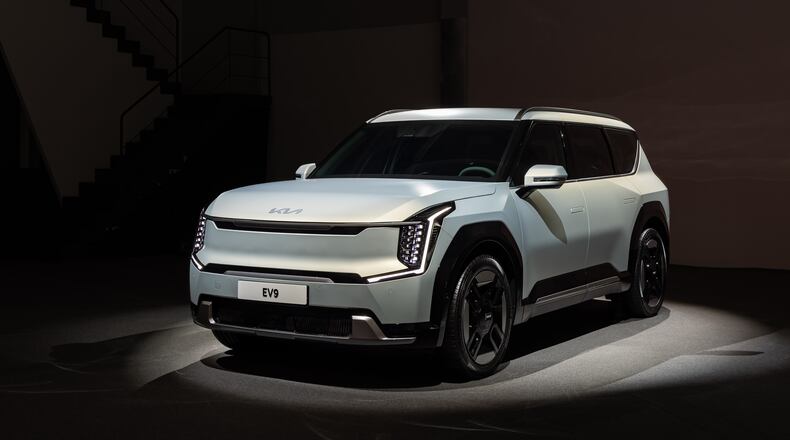Kia unveiled a new electric vehicle Wednesday, which the automaker says it will manufacture at its existing Georgia factory in West Point.
The EV9 will be the Korean automaker’s first three-row electric SUV, mirroring the company’s gas-powered West Point-built Telluride model. The new EV was shown off Wednesday for the first time in North America at the 2023 New York International Auto Show.
Kia says the EV9 will go on sale in the U.S. by the end of this year, and the model will be built in Georgia starting in 2024.
“With the launch of the EV9, we are incorporating our experience in producing brilliantly designed, best-in-class SUVs with our deep expertise in developing the industry’s leading EVs,” Sean Yoon, president and CEO, Kia North America and Kia America, said in a news release. “The EV9 is a credible, high-value SUV that encapsulates our approach to bringing innovative, consumer-focused products to market with a serious commitment to electrification.”
The West Point factory, which opened in 2009, currently assembles popular models like the Telluride and Sorento SUVs. Batteries for the EV9 will eventually be built at a previously announced factory in Bartow County that’s a joint partnership between SK Innovation and Kia’s parent company, Hyundai Motor Group. Separately, Hyundai is building a $5.54 billion factory near Savannah that will produce Hyundai, Kia and Genesis EVs.
Kia previously announced its West Point facility would incorporate EV manufacturing in the near future. The company did not say whether more employees will be hired as a result of the EV9′s local production. It’s also unclear how many EV9 models Kia expects to produce per year.
Hyundai Motor Group and its brands have aggressive plans to expand EV manufacturing in the U.S. The Bryan County factory, for example, will have capabilities to produce 300,000 EVs its first year, which can be expanded to 500,000 contingent upon customer demand.
The EV9 will join Kia’s other two fully-electric vehicles — the EV6 crossover and a Niro EV based on the conventional model. Kia also sells several hybrid or plug-in hybrid vehicles, including electrified versions of its Sorento, Niro and Sportage crossovers.
Georgia lawmakers in January feted the Korean automaker with “Kia Day” at the Gold Dome, honoring not only the automaker’s impact in West Point, but also the investments to come.
“Any vehicle in the very near future that does not have some sort of electrons working for it to propel is going to feel very old very soon,” Kia America spokesman James Bell told The Atlanta Journal-Constitution at the time.
Kia said the most potent EV9 model will be able to accelerate from 0-to-60 miles per hour in five seconds. It also takes fewer than 25 minutes for the SUV’s 800-volt electric drive train to go from a 10% to an 80% charge.
The expected sales price of the vehicle was not provided. To qualify for a $7,500 price reduction under federal law, the SUV must be priced less than $80,000. President Joe Biden, who has made increasing domestic EV production an explicit goal, said in a statement that, “Georgia is ground zero for building a clean energy economy and building industries of the future.”
Georgia has attracted several multi-billion-dollar electric battery and vehicle manufacturing plants in recent years, positioning itself as as a leader in what many automakers see as the future of the automobile industry. Gov. Brian Kemp thanked Kia on Twitter for the continued investment, adding that Georgia is “well on its way to becoming the EV capital of the nation.”
Since 2020, more than 35 EV-related projects have been announced in Georgia, totaling more than $21 billion in investment and 27,400 jobs, according to Kemp’s office. Hyundai’s Bryan County factory, the state’s largest economic development project, accounts for a large portion of the state’s EV investment. It has spurred a half dozen parts suppliers to announce factories for the surrounding region.
The state’s second-largest project is also EV related. California-based startup Rivian plans to build a $5 billion manufacturing facility in southern Morgan and Walton counties, roughly an hour east of Atlanta.
State and local incentives have played a central role in attracting the EV industry to the Peach State. Hyundai, for instance, received a $1.8 billion incentive package for its Bryan County factory. When Kia first came to West Point, it received about $469 million in incentives.
Georgia has also attracted other sections of the electric vehicle and battery sector, from charging infrastructure companies to battery recyclers. Ascend Elements, a company that recycles batteries and their scraps from factories, recently opened in Covington and chose Georgia because of all the buzz.
“There’s sort of a critical mass that starts to develop when an industry chooses to locate in a place,” Ascend Elements spokesman Thomas Frey recently told the AJC.
Kia operations throughout Georgia
- Kia opened its West Point factory in 2009, becoming Georgia’s sole automaker at the time after the closures of plants from Ford and General Motors.
- Kia announced Wednesday it will manufacture its new EV9 electric SUV at West Point, starting in 2024.
- Kia’s parent company, Hyundai Motor Group, is building two massive EV-related plants in Bryan and Bartow counties.
- The Bartow County plant, a joint venture with SK Innovation, will provide EV batteries to use in vehicles assembled at West Point.
About the Author
Keep Reading
The Latest
Featured




